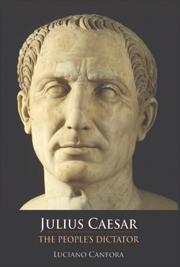Book contents
- Frontmatter
- Contents
- Translators' Note
- Acknowledgements
- Foreword
- PART I FROM SULLA TO CATILINE
- PART II FROM THE TRIUMVIRATE TO THE CONQUEST OF GAUL
- PART III THE LONG CIVIL WAR
- PART IV FROM THE CONSPIRACY TO THE TRIUMPH OF CAESARISM
- 29 Inklings of Conspiracy
- 30 ‘Iure caesus’
- 31 The Lupercalia Drama
- 32 The Dictatorship
- 33 Epicureans in Revolt?
- 34 The Hetairia of Cassius and the Recruitment of Brutus
- 35 A Conspirator's Realism: Cassius Settles for the Second Rank
- 36 Some Unexpected Refusals
- 37 Cicero – an Organiser of the Conspiracy?
- 38 The Serious Mistake of Dismissing the Escort
- 39 The Dynamics of the ‘Tyrannicide’
- 40 ‘Where's Antony?’
- 41 Caesar's Body: How to Turn Victory into Defeat
- 42 The Wind
- Chronology
- Bibliography
- Index
40 - ‘Where's Antony?’
from PART IV - FROM THE CONSPIRACY TO THE TRIUMPH OF CAESARISM
Published online by Cambridge University Press: 05 August 2013
- Frontmatter
- Contents
- Translators' Note
- Acknowledgements
- Foreword
- PART I FROM SULLA TO CATILINE
- PART II FROM THE TRIUMVIRATE TO THE CONQUEST OF GAUL
- PART III THE LONG CIVIL WAR
- PART IV FROM THE CONSPIRACY TO THE TRIUMPH OF CAESARISM
- 29 Inklings of Conspiracy
- 30 ‘Iure caesus’
- 31 The Lupercalia Drama
- 32 The Dictatorship
- 33 Epicureans in Revolt?
- 34 The Hetairia of Cassius and the Recruitment of Brutus
- 35 A Conspirator's Realism: Cassius Settles for the Second Rank
- 36 Some Unexpected Refusals
- 37 Cicero – an Organiser of the Conspiracy?
- 38 The Serious Mistake of Dismissing the Escort
- 39 The Dynamics of the ‘Tyrannicide’
- 40 ‘Where's Antony?’
- 41 Caesar's Body: How to Turn Victory into Defeat
- 42 The Wind
- Chronology
- Bibliography
- Index
Summary
‘Where's Antony?’ – Fled to his house amazed.
Shakespeare, Julius CaesarThis exchange between Caesar and Trebonius, in Act III, Scene 1, of Julius Caesar, follows immediately after the fatal dagger-blows which end the dictator's life. Shakespeare was a diligent reader of the ancient sources, and had culled from them and exploited a crucial and awkward point: the panic to which Antony gave way, having been detained by Trebonius outside Pompey's Curia while the assassination was taking place inside; and a little later Antony's attempt to reach an understanding with the assassins, with particular attention to the inner feelings of Brutus, the more moderate of the leading conspirators, who brandished their ‘red weapons’ while crying ‘Peace! freedom! and liberty!’ rather than ‘freedom and liberty’ (Act III, Scene 1, line 110). As we know from Cicero, some months earlier, while Caesar was in difficulty in Spain, Trebonius had been in contact with Antony – a fact which was potentially embarrassing to both parties, and for this reason Trebonius now had the task of keeping Antony away from the scene. To enter upon the minefield of conjecture would be futile, but it is very difficult to imagine a politician and man of action as experienced and circumspect as Antony suspecting nothing at all: it was far from normal for him to be stopped on some pretext on his way into the Senate, least of all on a day of great tension when Caesar himself, usually so contemptuous of superstition, had seemed reluctant to enter the Senate.
- Type
- Chapter
- Information
- Julius CaesarThe People's Dictator, pp. 334 - 336Publisher: Edinburgh University PressPrint publication year: 2007



